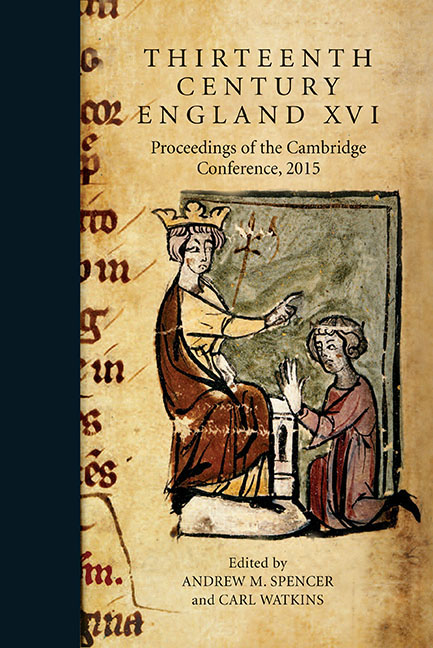Book contents
- Frontmatter
- CONTENTS
- List of Illustrations
- List of Contributors
- List of Abbreviations
- Introduction
- The Uncertainties of Reformers: Collective Anxieties and Strategic Discourses
- Moral Dilemmas in English Confessors’ Manuals
- Damnatio Eternae Mortis or Medicinalis Non Mortalis: The Ambiguities of Excommunication in Thirteenth-Century England
- The Contribution of Thomas Docking to the History of Political Thought
- Dealing with Inadequate Kingship: Uncertain Responses from Magna Carta to Deposition, 1199–1327
- The Rebel's Four Dilemmas in the Long Thirteenth Century
- The Daughters of William the Lion and Queen Ermengarde
- Simon de Montfort and the Ambiguity of Ethnicity in Thirteenth-Century Politics
- The Hue and Cry in Thirteenth-Century England
- Recalling Anglo-Scottish Relations in 1291: Historical Knowledge, Monastic Memory and the Edwardian Inquests
Moral Dilemmas in English Confessors’ Manuals
Published online by Cambridge University Press: 23 August 2019
- Frontmatter
- CONTENTS
- List of Illustrations
- List of Contributors
- List of Abbreviations
- Introduction
- The Uncertainties of Reformers: Collective Anxieties and Strategic Discourses
- Moral Dilemmas in English Confessors’ Manuals
- Damnatio Eternae Mortis or Medicinalis Non Mortalis: The Ambiguities of Excommunication in Thirteenth-Century England
- The Contribution of Thomas Docking to the History of Political Thought
- Dealing with Inadequate Kingship: Uncertain Responses from Magna Carta to Deposition, 1199–1327
- The Rebel's Four Dilemmas in the Long Thirteenth Century
- The Daughters of William the Lion and Queen Ermengarde
- Simon de Montfort and the Ambiguity of Ethnicity in Thirteenth-Century Politics
- The Hue and Cry in Thirteenth-Century England
- Recalling Anglo-Scottish Relations in 1291: Historical Knowledge, Monastic Memory and the Edwardian Inquests
Summary
Cases of conscience are real or imagined moral dilemmas involving a choice between two non-ideal courses of action. Writings on cases of conscience – casuistry – were a feature of Catholic moral philosophy through the early modern period and into the nineteenth century, with a phase of particular notoriety in the mid seventeenth century. To historians of the Counter-Reformation, casuistry is a familiar concept because of the abundance of writings on practical ethics produced and because the subject of casuistry played a prominent role in religious polemic. When Martin Luther made a bonfire of books he believed to be dangerous to the Christian faith in 1520, he included a popular book of cases of conscience, the Summa Angelica. Blaise Pascal satirised the casuistry of the Jesuits in his Lettres Provinciales. In reformed England in the late sixteenth century, Jesuit evangelists were found to carry small treatises with advice on cases of conscience originating from the seminaries at Douai and Rheims, which were intended to provide moral guidance to Catholics negotiating a complicated path between dissimulation and recusancy. Although casuistry is thus most associated with the social and religious history of the sixteenth century, it was also a common feature of penitential writing in England and Europe in the thirteenth century. Earlier writings on moral cases have attracted much sparser recognition in modern scholarship than their early-modern counterparts, yet they were no less a feature of medieval pastoral treatises, and played just as crucial a role in medieval pastoral care.
These medieval moral dilemmas are the subject of this paper; it will argue that their appearance in English confessors’ manuals marked the beginning of a new genre of Catholic moral philosophy. There had, of course, been discussions about applied ethics before the thirteenth century, but this was the first time that there was a sustained interest in the subject, and that it was attached so closely to pastoral care and penitence. The combination of moral dilemmas and penitential advice would later also characterise the collections of cases of conscience in the sixteenth century.
‘Casuistry’ was not immediately recognised as such in the Middle Ages.
- Type
- Chapter
- Information
- Thirteenth Century England XVIProceedings of the Cambridge Conference, 2015, pp. 21 - 36Publisher: Boydell & BrewerPrint publication year: 2017

